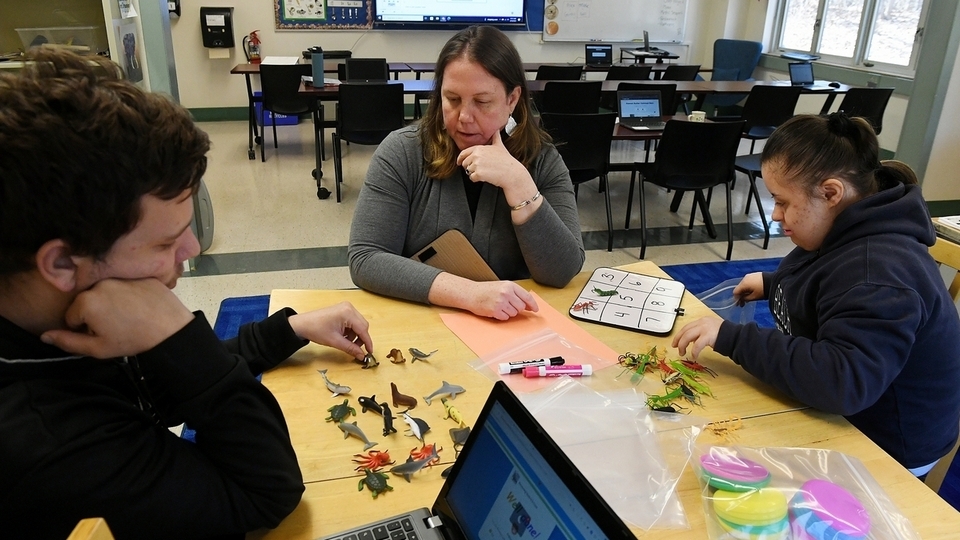The Day – Norwich Transition Academy ready to show off new, larger facility
Norwich — A year ago, when cooking class started, Anthony Nagel would linger outside the tiny kitchen at the Norwich Transition Academy, claustrophobia overcoming his love of cooking hot, spicy food.
Nagel, 21, of Danielson, in his final year of the post-high school vocational training program, now is all-in when it’s time to cook meals.
Thanks to a federal court ruling that requires Connecticut to provide education for students with learning disabilities through age 21 — not ending at their 21st birthdays — the Norwich Transition Academy this year needed to move to larger quarters to accommodate the expanded enrollment. The program serves Norwich students and tuition-paying students from throughout the region.
Last summer, the program moved from the Hickory Street School, a former convent in Greeneville, into the former Case Street Early Learning Center at 30 Case St., once a banquet hall. The building features a commercial kitchen similar to restaurant kitchens students will find at possible future jobs, spacious classrooms, private consultation offices, an activities and dining room and outdoor grounds for a garden and picnic area.
“I think it’s a 10 out of 10,” Nagel said, rating his new school.
Program Director Thomas Dufort agreed. And now, with COVID-19 restrictions easing, NTA is ready to show off the space to parents, the Board of Education, city leaders, business representatives from job sites that employ the students, potential new job partners and the public.
The school will host an open house from 5:30 to 7 p.m. Wednesday at 30 Case St. Students will bake cookies and muffins, and Dufort will buy coffee and doughnuts for guests. Participants will tour the school and learn about its job training, life skills and independent living programs.
Dufort said he hopes families with students eligible to enroll will attend.
COVID-19 anxieties still are affecting the program. Last summer, 36 students were identified for the voluntary post-high school program, but Dufort said more than a dozen never attended. Some lost interest when programs shifted online at the start of the pandemic, making it difficult for students to get the hands-on vocational lessons. Some never started the online sessions.
Norwich Transition Academy mixes academics with life and job skills, with individual and group lessons. The program has two teachers and seven job coaches, with two of those positions currently vacant. Job coaches accompany students to their income earning jobs at local supermarkets, restaurants, casinos, Advanced Auto Parts in Norwich, Tamarack Lodge in Voluntown and other sites.
Last Wednesday, teacher Alison Orcutt reviewed math lessons with new student Gabriella Musella, 18, of Norwich. Math is important for jobs that ask students to measure cooking ingredients or retrieve specific numbers of supplies from a storeroom, Dufort said.
In the kitchen, several students under the guidance of teacher Sarah Falcone, chopped fruits and vegetables and cooked sausages for that day’s “breakfast for dinner” omelets and fruit.
The kitchen’s center worktable can accommodate four students, while others cook at one of the two stoves or the griddle. The kitchen has the triple sinks, one for soap, one for rinse and one for sanitizing, required for commercial kitchens. Students will find the system familiar when they work at local restaurants, Dufort said.
A stacked washer-dryer stands in one corner alongside a laundry supply shelf. Students wash and iron their work uniforms each morning. Each student has a tall, narrow locker to hang uniforms and a separate, wider locker for backpacks and personal items.
Students need to learn to navigate public transportation for independent living. About twice a week, students and teachers catch a Southeast Area Transit bus on Case Street to shop at Walmart, Target and other stores. They compare prices for clothes, food, household and items. They learn bus schedules, fares and how to change buses to get to jobs and home.
They also take the SEAT bus to Mohegan Park for disc golf or to Old Tymes restaurant for lunch outings, Dufort said.
The goal, Dufort said, is for students to become independent adults, holding jobs and managing money to see if they can afford a car or an apartment.
While the court ruling requires the state to offer education up to their 22nd birthdays, Dufort hopes state officials allow for one change that would allow them to stay for the entire current school year. Now, students “age out” immediately when they turn 22, rather than completing the school year. They receive their diplomas and depart, some continuing with adult services through the state Department of Developmental Services.
Some students also leave early if they are ready to seek full-time jobs or if they are hired for jobs, Dufort said. They receive their diplomas.
Dufort invites graduates back for the graduation barbecue at Tamarack Lodge in Voluntown. But they have to find their own transportation. Graduates are not allowed to use school transportation, and teachers cannot transport them, Dufort said.
“I hope it changes to run to the end of the school year,” Dufort said. “The school year ends in June.”

